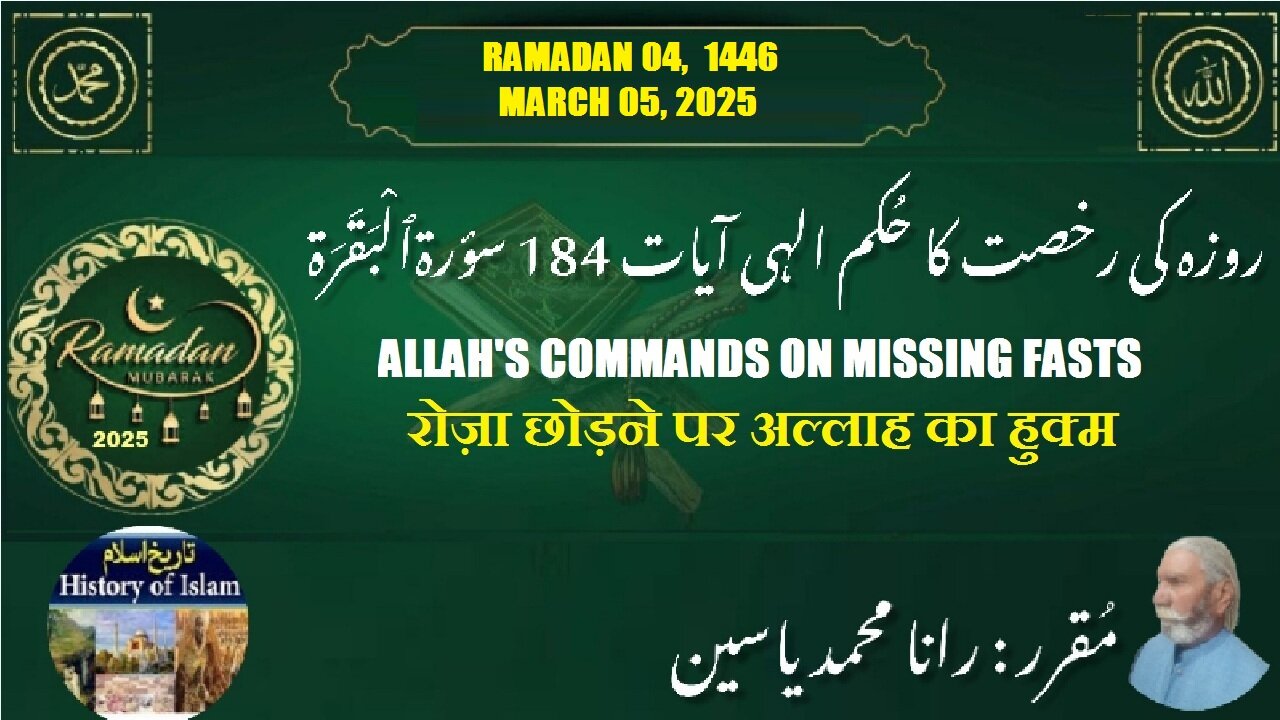Premium Only Content

Allah's Commands on Missing Fasts रोज़ा छोड़ने पर अल्लाह का आदेश روزہ چھوٹ جانے پر اللہ کے احکامات
@islamichistory813 #ramadan2025 #ramadan #reflections #surah #divine #command #breakthefast #albaqarah #moral #guidance #spiritual #journey #holymonth #islamic #teachings #islamic #wisdom #greatnessvirtue #ramadan #virtues #faith #reflection #regarding #verse184
The Divine Command to Break the Fast: Verse 184 of Surah Al-Baqarah
Asslamoalaikum sisters, brothers and elders, In this islamic informative enlightening video, we delve into Verse 184 of Surah Al-Baqarah, which presents the divine command regarding the observance of fasting. This verse not only outlines the significance of fasting during the month of Ramadan but also emphasizes the spiritual and communal benefits associated with this sacred practice. Please be with us upto end of this video as we are describing the deeper meanings and implications of this commandment, providing insights into its relevance in contemporary life. the verse's significance, its role in the practice of Ramadan, and the broader implications for believers. This discussion aims to enhance your understasting as a means of spiritual growth and self-discipline.
Fasting is a fundamental act of worship in Islam, prescribed in the Quran for the spiritual and physical well-being of believers. While the obligation of fasting is established in Surah Al-Baqarah (2:183), the divine command regarding breaking the fast and permissible exemptions is outlined in verse 184 of Surah Albarah, Allah Almight said:
"[Fasting for] a limited number of days. So, whoever among you is ill or on a journey—then an equal number of days [are to be made up]. And upon those who can fast with hardship—a ransom [as a substitute] of feeding a poor person. But to fast is best for you, if you only knew."
This verse provides guidance on breaking the fast, detailing valid excuses for doing so and introducing the concept of compensation (fidya) for those unable to fast due to chronic conditions or extreme hardship.
Before fasting in Ramadan became obligatory, Muslims practiced different forms of fasting, such as fasting on specific days or voluntarily. When Ramadan fasting was established, this verse clarified the allowances for those who were unable to fast due to travel or illness.
The permissibility to break the fast under certain conditions demonstrates Islam’s emphasis on ease and flexibility. Allah states in the subsequent verse 185 of Surah Albaqarah
"Allah intends for you ease and does not intend for you hardship."
This reinforces that fasting should not become an undue burden, and those who are genuinely unable to fast have valid alternatives.
Islam acknowledges that human health and circumstances vary, and thus fasting is not an obligation in all conditions. The Quran explicitly allows breaking the fast for those who are:
Ill: If fasting worsens an illness or delays recovery, one is permitted to break the fast and make up for it later.
Traveling: Travelers who experience hardship while fasting are also allowed to postpone their fast until they return home.
The Prophet Muhammad (peace be upon him) exemplified this flexibility. In Sahih al-Bukhari (Hadith 1944), it is recorded that:
"The Prophet (PBUH) traveled during Ramadan and broke his fast."
This establishes that traveling is a valid reason for delaying fasting, provided one makes up for the missed days afterward.
For those who are permanently unable to fast due to chronic illness, old age, or other insurmountable hardships, the Quran prescribes fidya (compensation):
"And upon those who can fast with hardship—a ransom [as a substitute] of feeding a poor person." (Quran 2:184)
This means that those who cannot fast at all should provide food to a needy person as a substitute. The amount is generally understood as the equivalent of one meal per fasting day.
Ibn Abbas (may Allah be pleased with him) clarified this ruling:
"It was allowed for elderly men and women who could not fast to feed a poor person instead." (Sahih al-Bukhari, Hadith 4505)
This shows that Islam prioritizes compassion and makes accommodations for those with genuine difficulties.
While the Quran provides concessions for breaking the fast, it also states:
"But to fast is best for you, if you only knew." (Quran 2:184)
This encourages believers to fast if they are capable, highlighting its spiritual benefits. The Prophet Muhammad (peace be upon him) reinforced this when he said:
"There is nothing comparable to fasting." (Sahih al-Nasa’i, Hadith 2223)
Thus, fasting is always preferred when one can do so without undue hardship.
This divine command carries several lessons and principles:
Ease in Worship: Islam is a religion of balance, allowing exemptions when necessary while still encouraging devotion.
Compassion for the Weak: The provision of fidya ensures that those unable to fast still participate in the spirit of Ramadan.
Personal Accountability: Individuals must assess their own capacity and determine whether they should fast or use an exemption.
Today, Muslims worldwide observe this verse in various circumstances:
Medical Conditions: Diabetics, patients undergoing treatments, and those with chronic illnesses often rely on the fidya provision.
Frequent Travelers: Business professionals and those who travel long distances often delay their fasts until they return home.
Elderly Individuals: Many elderly Muslims who cannot endure fasting engage in charitable acts, following the Quranic commandment.
Breaking the fast as per the Quranic command is not an act of weakness but an act of obedience. The Prophet Muhammad (peace be upon him) stated:
"It is not righteousness to fast while traveling if it causes harm." (Sahih al-Bukhari, Hadith 1946)
This further underscores that Islam prioritizes well-being over rigid adherence.
The divine command in Surah Al-Baqarah (2:184) provides guidance on breaking the fast for valid reasons and emphasizes the mercy of Allah in Islamic law. By allowing exemptions and alternatives, Islam ensures that worship remains accessible and manageable for all believers. Whether through making up missed fasts or giving fidya, every Muslim has a way to fulfill this obligation. May Allah grant us wisdom to observe His commandments with sincerity and devotion. Ameen.
Allah Hafiz
==================================
-
 11:12
11:12
ISLAMIC HISTORY
1 day agoIslamic History Episode 240 Mutaz Billah & Ahmad ibn Tutan मुताज़ बिल्लाह معتز بلہ اور احمد بن طوطان
5 -
 LIVE
LIVE
MattMorseTV
46 minutes ago🔴COURT DATE for Kirk's ASSASSIN.🔴
517 watching -
 LIVE
LIVE
Benny Johnson
1 hour agoChristianity Under Attack: Trump Declares 'Epidemic of Violence' on Christians As Church Shot,Burned
5,691 watching -

Nikko Ortiz
1 hour agoChurch Shooting And Arson Attack In Michigan - Rumble LIVE
8.24K2 -
 1:00:21
1:00:21
VINCE
2 hours agoThe Left's "Mostly Peaceful" Terrorists + Guest Eric Trump | Episode 135 - 09/29/25
173K86 -
 LIVE
LIVE
LFA TV
14 hours agoBREAKING NEWS ALL DAY! | MONDAY 9/29/25
4,636 watching -
 LIVE
LIVE
The Big Mig™
2 hours agoPesticides & Herbicides, The Ugly Truth w/ Zen Honeycutt
3,900 watching -
 LIVE
LIVE
Bannons War Room
7 months agoWarRoom Live
14,338 watching -
 LIVE
LIVE
LadyDesireeMusic
1 hour ago $0.20 earnedLive Piano & Convo | Support a Culture Change | Make Ladies Great Again
114 watching -
 35:58
35:58
Mike Rowe
3 days agoWhat About Jimmy Kimmel? | Hot Takes
19.5K37